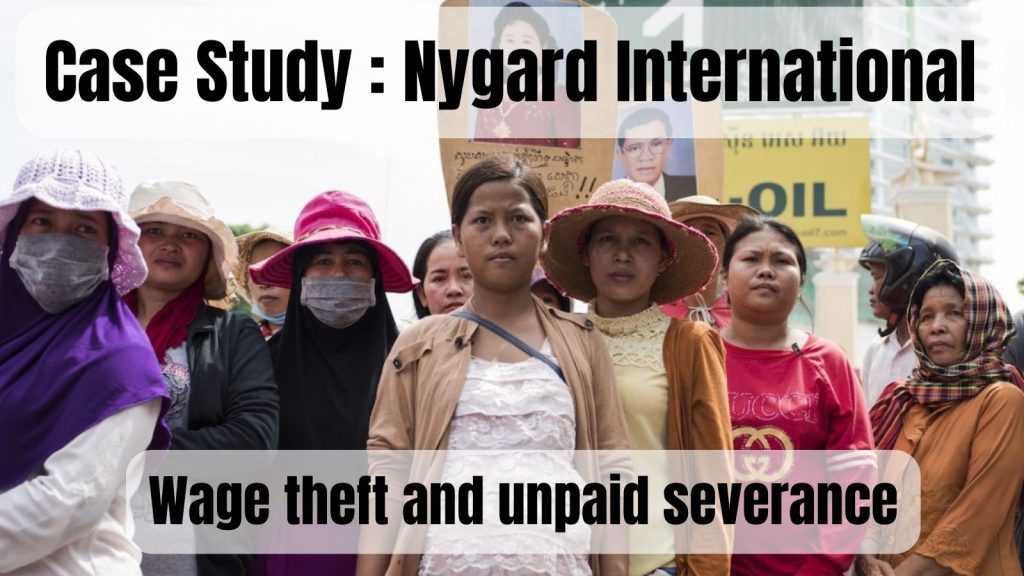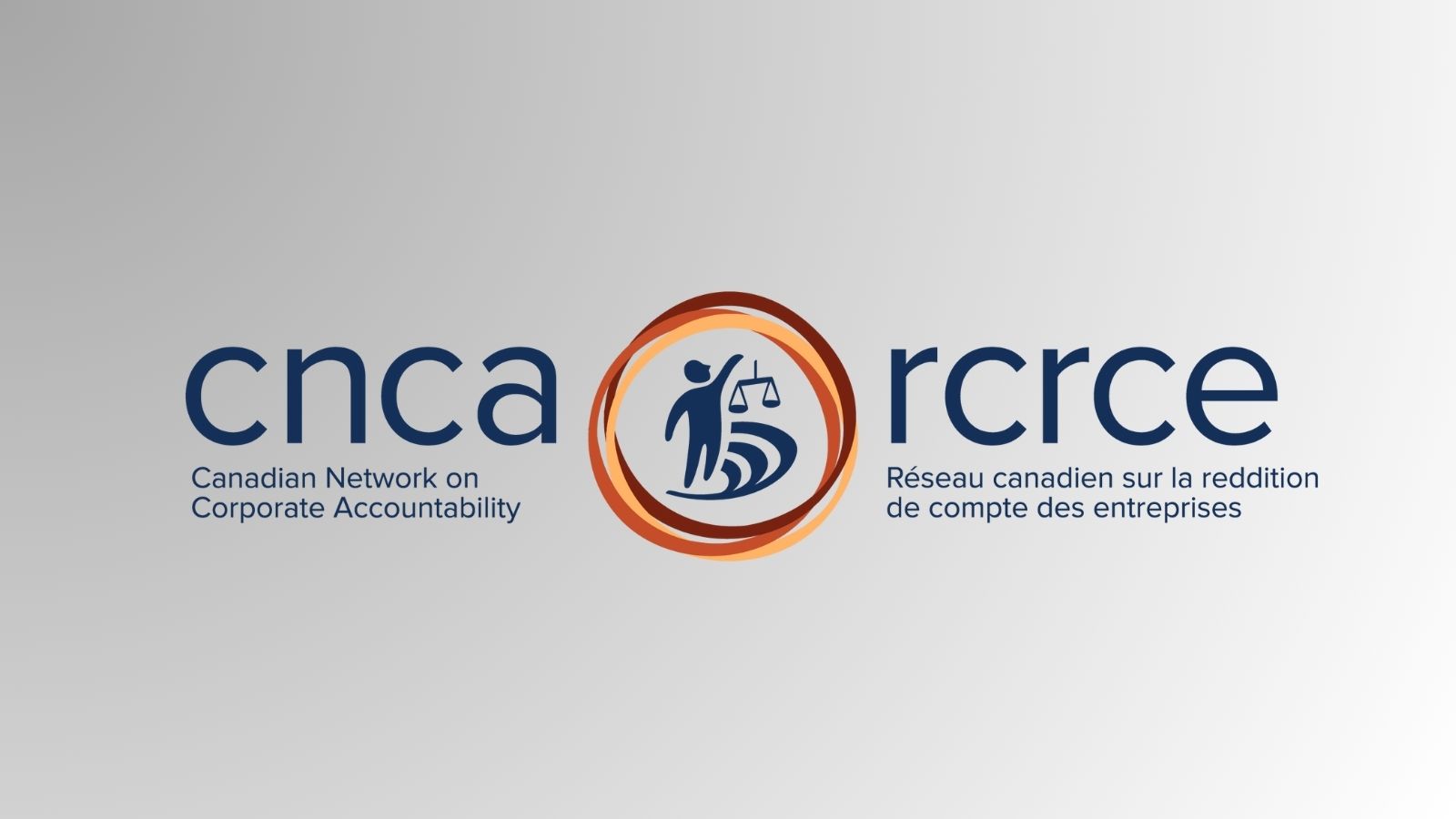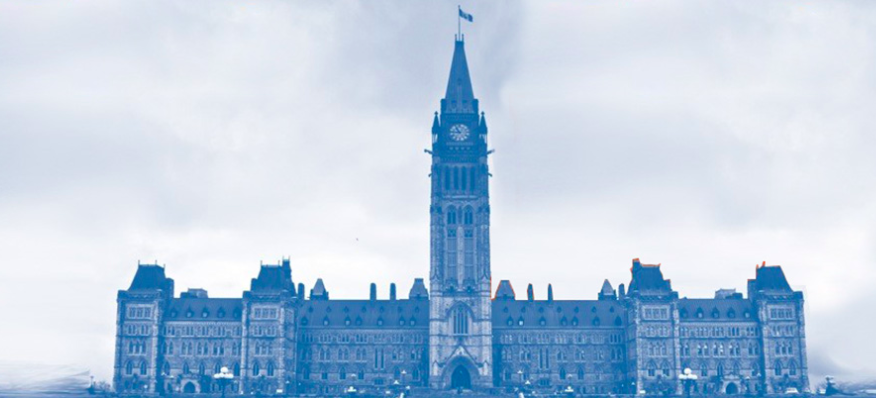[1] Not too long ago, Nygard International, a privately held women’s fashion clothing company, was Canada’s largest producer of women’s apparel. Founded by Peter Nygard, with offices located in Winnipeg, Toronto, and New York, Nygard’s clothing brands included well known Tan Jay, Alia, and the Bianca Nygard line, and were sold in major department stores and stand-alone retail outlets across Canada and the United States. The company filed for bankruptcy in 2020 in Canada and the United States. [2]
Summary
- In 2016, 208 garment workers were suddenly left unemployed when the Chung Fai Knitwear Factory in Phnom Penh, Cambodia closed without warning.
- Workers were never paid their legally owed wages, severance, and other legal entitlements associated with the closure, causing the workers to face severe economic hardship.[3]
- According to import records and worker testimonies, the factory produced Nygard clothing; however, Nygard denied any relationship with the factory and did not assume any financial or moral responsibility to ensure workers received what they were legally owed.
The Detail
Wages in the global garment industry have remained at poverty levels, despite clothing brands’ purported commitment to ensure workers in their supply chains are paid enough to cover their basic needs. To compound this systemic issue, when garment workers are dismissed due to a sudden and unannounced factory closure, they are frequently left without being paid their legally owed wages, severance, and other legal entitlements. Such ‘wage theft’ is often brought on by global brands’ own purchasing practices – brands’ failure to pay the factories that produce their clothing enough to cover production costs. This causes manufacturing facilities to decrease their own bottom line, often at the expense of labour rights.[4] Coupled with subsistence level wages, the failure to pay workers their legal entitlements leaves workers in dire economic situations, unable to meet their basic needs.
Unauthorized subcontracting facilities, which are commonplace in many garment producing countries, including Cambodia, also contribute to the occurrence of wage theft; factories that are unable to meet brands’ high production demands often contract other facilities to help complete the work. Due to a lack of monitoring and oversight at many of these sites, labour abuses frequently occur.[5]
Brands sourcing from a factory have a responsibility, according to the UN Guiding Principles on Business and Human Rights, to take steps to ensure that the workers who produce their clothing are remunerated adequately. [6] The right to a living wage – to earn enough to ensure a decent standard of life – is a fundamental human right.[7] Studies carried out by the Worker Rights Consortium on the non-payment of severance in the garment and footwear sectors shows that failure to pay proper severance, especially in countries which lack employment insurance safety nets, leads many workers to struggle to pay for basic needs – an issue further highlighted by the factory closures caused by the COVID-19 pandemic.[8]
Unfortunately, despite stated commitments in many brands’ codes of conduct to ensure workers in their supply chain are properly remunerated, brands do not assume this responsibility, and none pay a living wage throughout their supply chain.[9]
On June 27, 2016, 208 garment workers were suddenly left unemployed when the Chung Fai Knitwear Factory in Phnom Penh, Cambodia closed without warning. The workers, including 126 who had laboured there for more than ten years,[10] were not paid their June wages or any of the legally required[11] payments associated with an unannounced closure, according to Cambodian Law.[12] Import records and worker testimonies showed that the factory produced Nygard clothing; however, Nygard denied any relationship with the factory and would not assume responsibility to pay the workers what they were legally owed. The workers have never received their full compensation.
While the factory owner notified workers that they could sell the factory’s remaining assets in lieu of payment, many of the more expensive assets had previously been removed, leaving a value of less than 10%[13] of what the workers were owed. In an attempt to protect the remaining assets, the workers organized a 24-hour vigil outside of the factory to prevent the removal of further equipment. They also filed an injunction with the Phnom Penh Municipal Court to ensure the remaining equipment in the factory was not removed or sold by the owner. Another complaint was filed with the labour dispute resolution branch of the Ministry of Labour who confirmed that the workers were entitled to various payments under Cambodian law.[14] This led the workers to file a formal complaint in the Municipal Court for their final month’s wages and severance pay for years worked – calculated to be a total of USD$550,000 for all the 208 workers.
Over a month later, however, the court indicated that the preparatory hearing could not proceed because the factory was closed and the court could not locate the owner, and that it would first be the workers’ responsibility to attempt to locate him.[15]
The workers organized numerous protests to denounce the slow-moving legal procedures and to pressure the three brands alleged to be sourcing from the factory – Nygard International and two UK brands, Marks & Spencer and Bonmarché – to take responsibility for the factory’s failure to pay its workers. They also sought support from international labour rights organizations, including the Clean Clothes Campaign, Labour Behind the Label, Workers United Canada and the Maquila Solidarity Network who launched a global campaign.[16] Despite this continued pressure and letters from the workers and labour rights organizations, all three brands denied having a direct contractual relationship with the Chung Fai Knitwear Factory and therefore shirked responsibility for ensuring the 208 workers received what they were legally owed.
For its part, Nygard skirted responsibility[17] for the subcontract, despite worker testimonies and import records that showed Nygard received 29 clothing shipments from the factory between April 2013 through April 2016.[18] Workers were left with severe economic hardship, often unable to find subsequent work, unable to pay for rent or health care, and many had to take out loans, accumulating debt.[19]
What if…?
If mandatory human rights and environmental due diligence legislation was in place, how would the lives and livelihoods of these Cambodian workers be different?
- It would be more likely that workers at the Chung Fai Knitwear factory would have received their legally owed wages and compensation as soon as their employment ended, as Nygard would have risked being held accountable if it failed to ensure their proper remuneration.
- If Nygard had taken human rights due diligence seriously, the company would have ensured that the factory it was sourcing from, and all of its subcontracted facilities, respected national laws and international labour rights regarding payment of wages and severance. If Nygard still failed to take these important preventative steps, the company could have been held liable in a Canadian court to access justice.
- Respect for core labour standards, including freedom of association and collective bargaining (as called for in the OECD Guidelines) would strengthen the capacity of workers and trade unions to register, negotiate fair wages with employers and have access to legal grievance procedures.
How?
Clothing companies like Nygard would have to take the time to identify and assess human rights risks, prevent and mitigate human rights impacts, and account for how to address those impacts throughout their supply chain.
- IDENTIFY and ASSESS: If Nygard had undertaken an adequate risk assessment it would have identified:
- The high risk that workers would not be paid what they were legally owed
- The risk that Nygard’s own purchasing practices would undercut factories’ capacity to pay workers in the first place
- The well-documented risk in the garment sector that when a factory closes, workers are often left with no effective legal recourse for unpaid wages and benefits owed and are therefore unable to meet their basic needs.
- PREVENT, MITIGATE, ACCOUNT FOR: Nygard could have taken steps to ensure compliance with national laws and international labour rights standards by:
- Ensuring that the factories it sourced from had policies and practices that protected workers and that were in line with the company’s own Code of Conduct to avoid pervasive labour rights abuses.
- Demonstrating that its annual reports included all of its factories and suppliers – information that is often hidden from public scrutiny – thus preventing companies from remaining wilfully ignorant of abuses.
- Accounting for the steps it took to ensure proper payment of wages and benefits were respected in its global operations.
- Justice could have been accessed for workers:
- Trade unions, human rights organizations, and/or affected workers would have been able to access justice and seek remedy. They would have been able to sue Nygard in a Canadian court for its alleged failure to prevent harm, obliging the company to defend the adequacy of its due diligence measures, and resulting in the potential that it be held liable for failing to adequately account for human rights risks and prevent harm.
Endnotes
[1] This case study profiles allegations of human rights abuse contained in publicly available reporting by reputable sources. The CNCA has not independently verified the allegations contained in each report cited here.
[2] Porter, Catherine. For Peter Nygard, Alone and Jailed, Rags-to-Riches Story Turns Upside Down. New York Times. January 21, 2021. https://www.nytimes.com/2021/01/21/world/canada/peter-nygard-bail.html#:~:text=After%20federal%20authorities%20raided%20his,would%20follow%20any%20bail%20conditions Accessed August 15, 2021.
[3] Clean Clothes Campaign. Chung Fair Knitwear Fty, Ltd Case Profile. ND. https://archive.cleanclothes.org/img/pdf/chung-fai-case-profile Accessed July 29, 2021.
[4] Workers Rights Consortium. 2021. Fired then robbed: Fashion brands’ complicity in wage theft during Covid-19. Pp. 5-11. https://www.workersrights.org/wp-content/uploads/2021/04/Fired-Then-Robbed.pdf Accessed July 29, 2021.
[5] Kashyup, Aruna. The Secret Underbelly of the Cambodian Garment Industry. Human Rights Watch. October 24, 2016. https://www.hrw.org/news/2016/10/24/secret-underbelly-cambodian-garment-industry Accessed August 5, 2021.
[6] See Article 23(3) of the Universal Declaration on Human Rights and Article 7 of International Covenant on Economic, Social and Cultural Rights. The UN Guiding Principles on Human Rights state that companies have a responsibility to at least take steps to ensure workers in their supply chain receive a living wage, especially when they are knowingly sourcing from countries that do not uphold living wage standards. For more on this see Business and Human Rights Resource Centre. 2021. Wage theft and pandemic profits: The right to a living wage for garment workers. https://media.business-humanrights.org/media/documents/Unpaid_wages_v9.pdf Accessed August 15, 2021; and The Circle. 2017. Fashion focus: The fundamental right to a living wage. https://www.thecircle.ngo/wp-content/uploads/2015/11/Fashion-Focus-The-Fundamental-Right-to-a-Living-Wage-1.pdf Accessed August 15, 2021.
[7] The Circle. Fashion Focus: A proposal for new EU Legislation on a living wage. April, 2021. https://www.thecircle.ngo/campaigns/a-living-wage/ Accessed January 29, 2022; Labour Behind the Label. Tailored Wages UK: The state of pay in the global garment industry. 2019. http://labourbehindthelabel.net/wp-content/uploads/2019/06/TailoredWagesUK-FP-updated.pdf Accessed January 29, 2022; Labour Behind the Label. Tailored Wages UK: Are the big brands paying the people who make our clothes enough to live on? https://labourbehindthelabel.org/wp-content/uploads/2015/10/TailoredWagesUKweb_1.pdf Accessed January 29, 2022.
[8] Workers Rights Consortium. 2021. Fired then robbed: Fashion brands’ complicity in wage theft during Covid-19. p.7 Table 1. https://www.workersrights.org/wp-content/uploads/2021/04/Fired-Then-Robbed.pdf Accessed July 29, 2021; Workers Rights Consortium. Wage Theft. https://www.workersrights.org/issues/wage-theft/ Accessed July 29 2021; and Workers Rights Consortium. 2013. Impact of Nonpayment of Severance on Families of PT Kizone Workers. https://www.workersrights.org/wp-content/uploads/2016/09/WRC-Memo-re-PT-Kizone-Update-3.26.13.pdf
[9] Le Baron, Genevieve; Edwards, Remi; Hunt, Tom; Sempéré & Krytsis, Penelope. The Ineffectiveness of CSR: Understanding Garment Company Commitments to Living Wages in Global Supply Chains. Review of International Political Economy. August, 2021. https://www.tandfonline.com/doi/full/10.1080/13563467.2021.1926954 Accessed November 4, 2021. Also see the original study that this research was based on: Edwards, Remi; Hunt, Tom; LeBaron, Genevieve. Corporate Commitments to Living Wages in the Garment Industry. May, 2019. Speri: Sheffield Political Economy Research Institute. http://speri.dept.shef.ac.uk/wp-content/uploads/2019/05/Corporate-Commitments-to-Living-Wages-in-the-Garment-Industry-SPERI-report.pdf Accessed November 4, 2021.
[10] Clean Clothes Campaign. Chung Fair Knitwear Fty, Ltd Case Profile. ND. https://archive.cleanclothes.org/img/pdf/chung-fai-case-profile Accessed July 29, 2021.
[11] Cambodia Labour Law Articles 73, 75, 89, 90. For an English summary see Workers Rights Consortium. 2021. Fired then robbed: Fashion brands’ complicity in wage theft during Covid-19. p.7 Table 1. https://www.workersrights.org/wp-content/uploads/2021/04/Fired-Then-Robbed.pdf Accessed July 29, 2021.
[12] Clean Clothes Campaign. Chung Fair Knitwear Fty, Ltd Case Profile. ND. https://archive.cleanclothes.org/img/pdf/chung-fai-case-profile Accessed July 29, 2021.
[13] Yanz, Lynda and Fowlie, Barry. Abandoned garment workers deserve justice from Nygard. Toronto Star. July 23, 2017. https://www.thestar.com/opinion/commentary/2017/07/23/abandoned-garment-workers-deserve-justice-from-nygard.html Accessed July 29, 2021.
[14] See Workers Rights Consortium. 2021. Fired then robbed: Fashion brands’ complicity in wage theft during Covid-19. p.7 Table 1. https://www.workersrights.org/wp-content/uploads/2021/04/Fired-Then-Robbed.pdf Accessed July 29, 2021.
[15] Clean Clothes Campaign. Chung Fair Knitwear Fty, Ltd Case Profile. ND. https://archive.cleanclothes.org/img/pdf/chung-fai-case-profile Accessed July 29, 2021.
[16] Maquila Solidarity Network. Join the global days of action against wage theft. December 14, 2017. https://www.maquilasolidarity.org/en/justice-nygard-ms-bonmarch Accessed July 29, 2021.
[17] Wells, Jennifer. The key to changing Nygard’s supply chain policy may lie with the consumer. Toronto Star. July 18, 2017. https://www.thestar.com/business/2017/07/18/the-key-to-changing-nygards-supply-chain-policy-may-lie-with-the-consumer-wells.html Accessed July 29, 2021.
[18] Glowacki, Laura. Nygard ignoring social responsibility to Cambodian garment workers, union says. CBC. August 10, 2017. https://www.cbc.ca/news/canada/manitoba/nygard-cambodia-1.4242164 Accessed August 29, 2021.
[19] Clean Clothes Campaign. Demand justice for Chung Fai workers in Cambodia. https://archive.cleanclothes.org/action/archive/Chung-Fai Accessed July 29, 2021.





